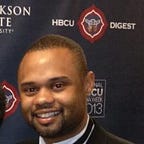A Tale of Title IX Campus Compliance Confusion
Morgan State University is case study on fine line between support and self-sabotage in search for gender equity.
This evening, the Morgan State University campus community will gather for a unity rallying, calling for peace and tolerance in a nation growing seemingly more divided along racial and political ideologies. In a letter to the community, Morgan State President David Wilson encouraged stakeholders to recognize the urgency for such an event.
Called #MSUNIFIED2K16, the primary purpose of the gathering is to show the nation that we as a Morgan community will not tolerate rhetoric that is laced with hatred, insults, and disrespect — rhetoric that, seemingly, is designed to divide us as a campus, city, state and nation based on our beliefs, our race, our sexuality, our religion, our ethnicity, or any other characteristic.
I’m urging the entire Morgan community — students, faculty, staff, alumni, and local City residents, to join together with us on this evening.
Let’s show the world the power of a unified bond.
One person who probably won’t be attending the rally is former Morgan State University head women’s basketball coach Donald Beasley. The Morgan State alumnus was reassigned last month following allegations of verbal abuse towards his players, ending an 11-year career in which he amassed 141 wins and an at-large postseason WNIT appearance in 2011.
Beasley maintains that he never received due process from university administration following the allegations, and rarely heard from executives about why he was being dismissed.
For a university which has made national headlines for executive controversy and mismanagement at presidential and board levels, and ongoing scrutiny from the federal government regarding its response to potential Title IX violations, the timing of the unity rally couldn’t be more peculiar, or misaligned with the institution’s struggles with gender equity on campus.
Morgan State Falls Short on Sexual Assault Response
In 2014, the Department of Education’s Office of Civil Rights launched an investigation against 66 colleges and universities stemming from a complaint of a mishandled sexual assault incident involving students. Morgan State, one of several Maryland institutions included among the initial round of investigations, remains among the more than 260 active investigations on the federal list for potential negligence, despite the state’s attorney’s office declining to pursue criminal charges in the incident.
The Baltimore City Paper profiled the case, detailing a campus with disjointed and limited approaches in handling incidents involving sexual assault or gender bias.
Information on the process — or even who to report a complaint to — isn’t easily accessible or clearly presented to students. Different administrators handle different reports — even for seemingly similar offenses. For example, Tanyka Barber, director of diversity and equal employment opportunity and the Title IX coordinator for the school, primarily handles cases between faculty members or between faculty members and students. Seymour Chambers, the head of student affairs and chief judicial officer, handles complaints from students who report that another student sexually assaulted them.
That process differs from the university’s official information resource on Title IX, which outlines examples and guidelines for how potential violations committed by students, faculty and staff can be reported. While the sexual assault complaint remains live, Beasley’s reassignment appears to be another example of breached compliance with federal guidelines.
Different Treatment for Female, Male Athletes?
In 2012, Morgan State announced an indefinite suspension for head men’s basketball coach Todd Bozeman for what some described as incidental, others as inappropriate, physical contact during a game between the Bears and South Carolina State University. The suspension lasted three games, following what university officials announced as ‘inconclusive results’ in the incident.
But Bozeman’s attorney maintained that the coach, like Beasley, never received due process or a formal notice of allegations in the hours following the incident, and the announcement of his suspension.
“He should never have been suspended before the investigation was completed,” said Ricky Lefft, Bozeman’s South Carolina-based attorney. “If the findings were inconclusive, a suspension was not appropriate. They punished him and damaged his reputation irreparably.”
Former basketball player Larry Bastfield never pressed criminal charges or filed a Title IX complaint against Bozeman with the institution, but the uneven punishment of a three-game suspension and a dismissal of a coach for physical contact and verbal abuse, respectively, toes the line of the federal government’s definition of gender discrimination.
“No person in the United States shall, on the basis of sex, be excluded from participation in, be denied the benefits of, or be subject to discrimination under any educational program or activity receiving federal financial assistance.”
By this definition, could the women’s basketball team be the beneficiary of discrimination against the men’s team, in that their allegations can result in a firing for Beasley, but only a suspension for Bozeman, for physical contact caught on film?
Morgan Makes Progress in LGBTQIA Issues
While the university appears to have an uneven policy on Title IX compliance in athletics, Maryland’s flagship HBCU has also received national headlines for its efforts to promote inclusion and tolerance for LGBTQIA students and faculty. In the years since former Morgan State student Brian Stewart made national headlines after being barred from applying to the campus’ chapter of Kappa Alpha Psi Fraternity Inc., the school has hosted several community-wide conversations on tolerance, including a 2015 convening of black pastors to address LGBTQIA social justice.
In April, alumni chartered a new chapter of the school’s national alumni association, comprised of graduates identifying as gay and lesbian.
Several Morgan students and faculty members were involved with the production of a groundbreaking mini-documentary “My God Too,” which profiles experiences of black gay and lesbian students at HBCUs and within the black church.
